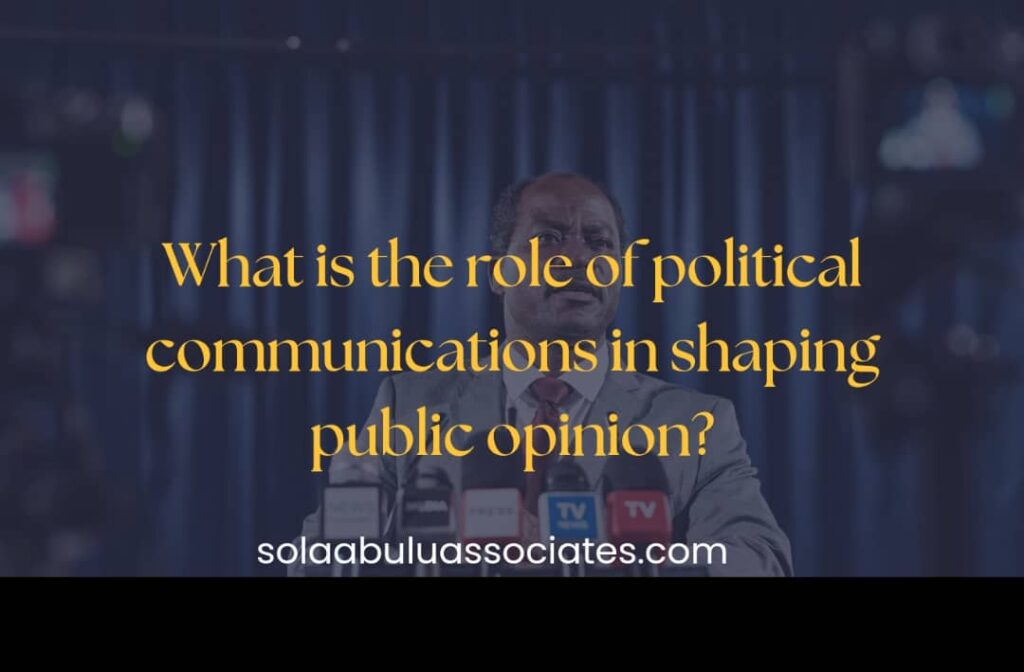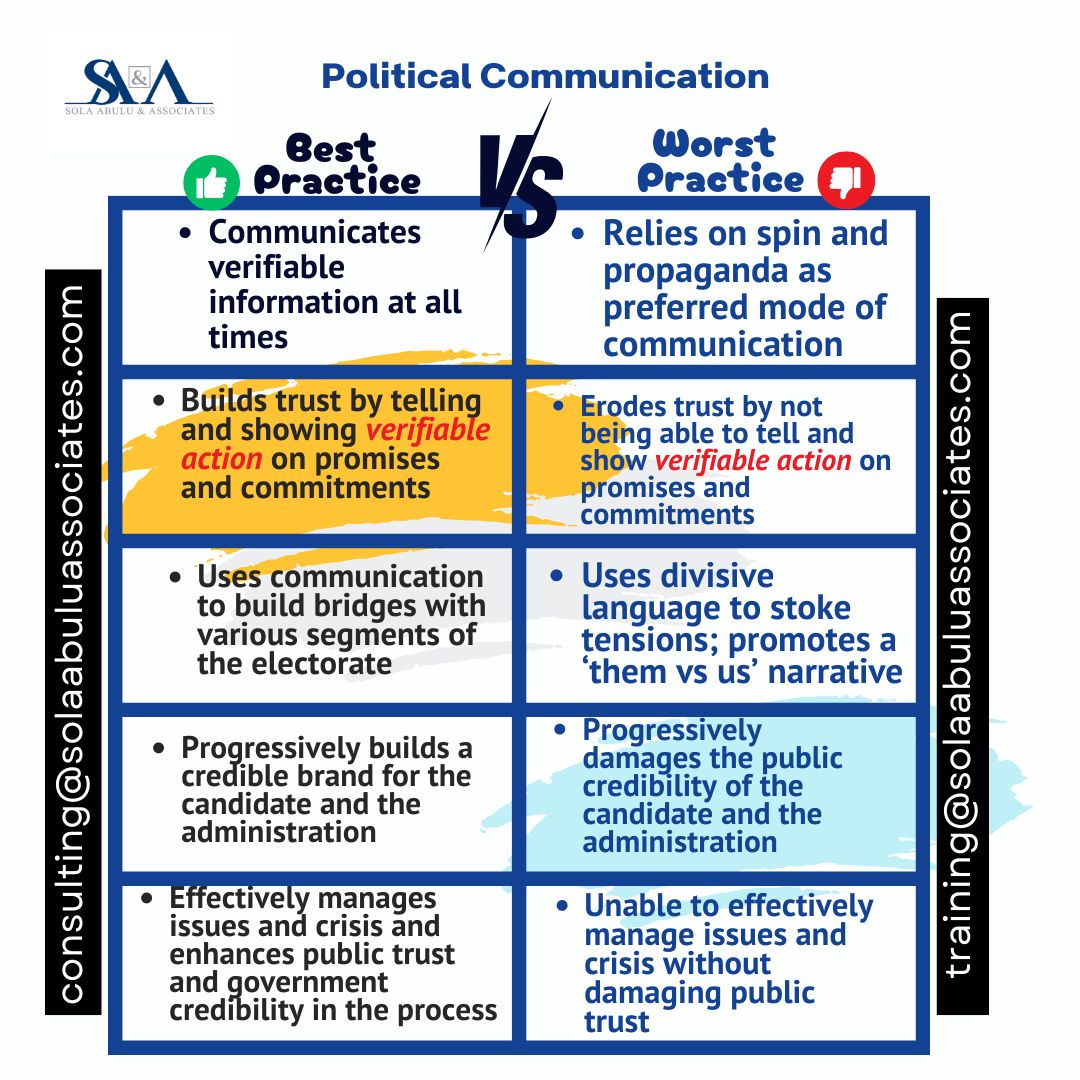What is the importance of political communication?

Ineffective political communication is why citizens protest, unions go on strike and political leaders lose their reputations. The effectiveness of political communications requires that communicators learn the science of political communications that is frameworks, principles and concepts and can tailor it to the context or concern at hand.
Political communication is the process by which political leaders, officials and opinion leaders communicate and engage with citizens and stakeholders for a defined purpose, campaign, or agenda.~ Sola Abulu.
The influence of political leaders on the electorate after their speeches and debates extends to framing issues, setting agendas, and even swaying public sentiment on critical matters. In political communications, all the media channels are used (traditional media and new media which is digital) because the target audience is the electorate. The electorates cut across different stakeholder groups and their preferred channel of communication differ. However, the channel for political communication can differ with smaller forms of elections like voting into a student union body.

The role of political communications in shaping public opinion:
- Builds trust: Trust is built when what is said in political debates and by political communicators are matched up by their verifiable actions. When political leaders cannot their promise to the people, they erode trust and it becomes more difficult to be trusted in the future.
- Strategic political communication ensures only verifiable information is communicated to the public. When political communicators are strategic, they completely avoid spinning and mere propaganda.
- Political communications can bridge the gap between the political leaders and electorates or masses. When there is little or no political communication, there is a risk of engendering tension with those on the political divide tends to create a “them vs us” narrative for the masses.
- Political communications build a positive brand for the candidate/political party and administration. This is similar to the first point raised because with a brand image comes trust.
- With political communications, issues are effectively managed so that they don’t become crises and in a crisis, when political communicators are strategic, they can foster credibility through open and transparent communication.
This article defines key terms in the public sector, policy and political communications.
Crafting the Message
Informing and influencing citizens is the major goal of political communication. Unfortunately, in many parts of the continent, the citizen, who largely remains the intended target of political messages, is frequently cut out of the interaction. This is partly because developing messages that shape and influence political processes is not an easy task for Africa’s political marketers. ~Bruce Mutsvairo
The above assertion is from Bruce’s Perspectives on Political Communication in Africa.
A good political communicator carefully crafts the narrative considering the nuances and complexity of the sector. Being open and transparent in communication is good but the public can lose out on the message if understanding is not achieved.
Also, the message should take a citizen-centric approach. This approach prioritizes citizens in the discourse. Bureaucracy hinders a transformative change in political communications. This explains why political sensitivity can be achieved through a citizen-centric communication approach. There is a need for more active stakeholder engagement with the different stakeholder groups and to influence them with a political agenda, the message should be persuasive.
In crafting the message, political communicators can be more effective when their message resonates with the public, addresses public concerns, highlights positions on key policies and builds a positive image of the political leader and party.
As far as I can tell, majority of political players are very strategic in terms of fulfilling their personal ambitions and ensuring their career longevity and influence within the public space. What is left unattended is the commitment to the people.
-
There is room for improvement in terms of how political campaigns are run at state and national level but in a context where the election process is flawed, it may not matter if you communicate strategically or not considering that there are several opportunities available to “game” the process unethically.
-
However, in a context where those opportunities do not exist or one is up against an equally or more formidable opponent, then there is opportunity to lean on the proper use of strategic communications that is based on a thorough stakeholder mapping of all citizens and stakeholders and an approach that is tailored towards transparently addressing their issues and concerns. And working hard to fulfil commitments as agreed or stated.~ Sola Abulu.
Read the full article on Effective public sector, policy and political communication in Nigeria and Africa.
When political communicators are credible and can craft effective messages, they contribute to political leaders’ effectiveness and positive branding. Also, the state will be able to achieve a high level of political participation by the electorate. And a high political engagement by the public which explains their trust in a leader is more likely to translate to support for policy initiatives by that government.
…………………………………………………………………………………………………..
Sola Abulu & Associates is a strategy and communications consulting and training firm committed to enabling African businesses, brands and organizations to achieve their objectives through strategic communications, organizational effectiveness and reputation risk management
Chat with us for more information on our courses.

THE IMPORTANT OF COMMUNICATION DEVELOPMENT IN THE SOCIETAL TO ORIENTATE PEOPLE’S ABOUT THEIR CULTURE AND ETHICAL
The communication development skills and acquisition is a lime light for mass communication with larger through social media platforms to disseminate information details inline with proficiency verbalize vitals relationship crucial rapport to update individuals on the daily basis activities.
Types of communication
Verbal communication, non verbal and visual communication
What are the ingredients of communication
1. Message
2. Source
3. Medium
4. Channel
5. Receiver / recipient
6. Sender
7. Feedback
The impacts of communication development skills is to having cognitive mutual understanding with sender and receiver either decoder of the information must be transparent and encoder in the mere fact that most suitable in communication to initiate strong interactions between public relationship with each other.
The ethics of communication is efficacy orally ideological that it’s taught us norms and values guide us morale regardless nature of exchange feeling and medium semiotics ambiguous communicative skilled functionally to show case direct or indirect balance communication in one way and the other.
Mass media is a piece of communication development in-depth analysis report via electronic media, print media and social media take for instance electronic media it is comprises both radio and television they can be transmitter to larger audience at a particular time while radio is an audio FM frequency modulation and AM amplitude modulation tower wave electromagnetic terrestrial through equalizer velocity medium garget as well as television is signal in both audio and visual transition for the viewers to be entertained, educate, sporting and news update. Print media are newspaper, magazine and journal publication. Social media is the means to online interactions between public relations with large masses and platform individuals such as tablet garget to connect on internet via email, WhatsApp, Facebook, Instagram, telegram and YouTube etc.
In conclusion new age communication development media has transformed functionality of foreign and local affairs link on International relationship disseminating information makes sense of communication supportive easier compares to those days in a nutshell media as been added more values to the humanitarian livelihood worldwide globally.
HRKM CHIEF, PROF. AYANNIRAN MATTHEW OYETUNDE AREMU
Facebook account:- Matthew Oyetunde
Contact number:- +2348035265655
Powered by ~#A.M.O#~